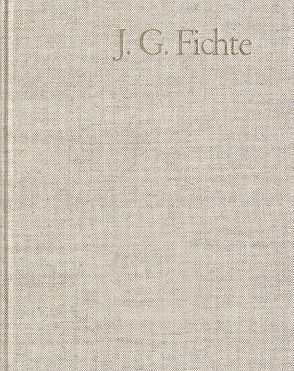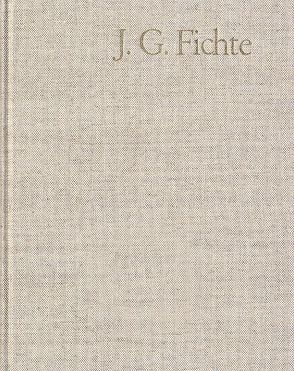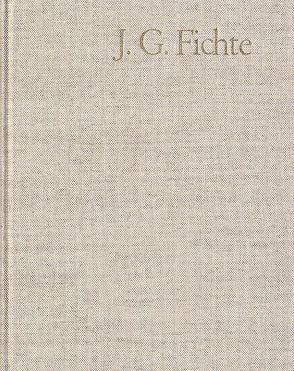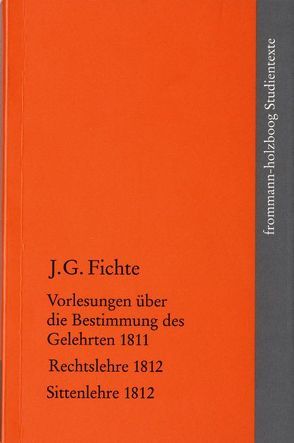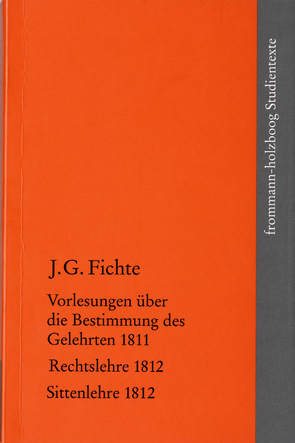
Dieser Band enthält Fichtes Vorlesungen von Mai 1811 bis August 1812: eine besonders gut ausformulierte Fassung des als Einleitung in das philosophische Geschäft konzipierten Vorlesungszyklus über die Bestimmung des Wesens und der Pflichten des Gelehrten, sowie die Ausführung der einzigen zwei Spezialdisziplinen, die Fichte in seinem Berliner Programm aufgenommen hat: die Rechtslehre und die Sittenlehre, welche am Manuskript neu kontrolliert und unter Einbeziehung der entsprechenden Kollegnachschriften hier ganz neu herausgegeben werden. Eine ausführliche Einleitung erläutert die einzelnen Arten von Vorlesungen innerhalb von Fichtes Lehrgebäude.
This volume contains Fichte‘s lectures held between May 1811 and August 1812. These include a particularly well written version of a series of lectures, designed as an introduction into the business of philosophy, on the determination of the nature and the duties of a scholar as well as the lectures on the only two special disciplines which Fichte had on his agenda in Berlin: jurisprudence and ethics. This is a new publication of these lectures, the manuscripts of which were re-examined, and also includes the transcripts of Fichte’s colleagues. A detailed introduction explains the individual kinds of lectures within Fichte’s system of theories.
Aktualisiert: 2023-03-14
> findR *
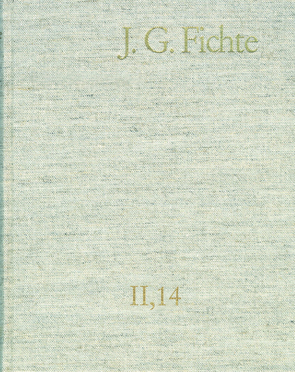
Die im Sommersemester 1812 gehaltene Vorlesung ›Vom Verhältniß der Logik zur wirklichen Philosophie‹ wird erstmals veröffentlicht. Sie analysiert das empirische Begreifen, zeigt den Vorrang der transzendentalen Logik gegenüber der formallogischen Konzeption des Denkens. Diesen Gedankengang führt die schon bekannte transzendentale Logik ›Vom Unterschiede zwischen der Logik und der Philosophie selbst‹ (WS 1812/13) fort, begreift den Begriff und die Anschauung und deduziert den Raum. Dieses wissenschaftliche Hauptwerk aus der Spätzeit Fichtes wird hier in stark verbesserter Form vorgelegt. Die Einleitungsvorlesung ›Vom Studium der Philosophie überhaupt‹ (WS 1812/13) erläutert neben den Bedingungen für das Verstehen der Wissenschaftslehre auch das Vorgehen Fichtes in den ›Transzendentalen Logiken‹.
This volume presents the remaining texts of 1812. The lecture course ›Vom Verhältniß der Logik zur wirklichen Philosophie‹ delivered in the summer semester of 1812 is accessible to research for the first time. It analyzes empirical understanding and demonstrates the contradictory conception of thought in formal and transcendental logic, arguing that the formal-logical view of thought is untenable. This view of cognition is completed in the winter semester of 1812/13 in the earlier known work on transcendental logic, ›Vom Unterschiede zwischen der Logik und der Philosophie selbst‹. This text passes from an understanding of the concept and the intuition up to the deduction of space. This work counts as one of the major philosophical writings of Fichte’s late period and is published here in a significantly improved form. The introductory lecture ›On the Study of Philosophy in General‹ (WS 1812/13) not only sets out the conditions for understanding the ›Wissenschaftslehre‹ but also Fichte’s procedure in the various versions of his ›Transcendental Logic‹. The volume is supplemented by two smaller texts whose dating is uncertain, ›Zur Herstellung eines verlohren gegangenen Mskpts ...‹ and ›2. noch Auszug‹.
Aktualisiert: 2023-03-14
> findR *

Die ›Thatsachen des Bewußtseins‹ vom Januar 1813 mit dem Hauptgewicht auf den praktischen Tatsachen und ihrer Begründung führen vorbereitend in die unvollendet gebliebene ›Wissenschaftslehre‹ vom Februar 1813 ein. Diese setzt bei der Einsicht an, dass alles Wissen nur im Verständnis seiner selbst ist. Aus diesem Verstehen des Verstehens werden die weiteren Prinzipien des Wissens hergeleitet. Das erstmals veröffentlichte Diarium I (März-August 1813) dokumentiert Fichtes ›Werkstattarbeit‹ für die Vorlesung der sogenannten Staatslehre mit ihren geschichtsphilosophischen und politischen Reflexionen. Außerdem nehmen darin Spekulationen zu letzten Begründungszusammenhängen der Wissenschaftslehre großen Raum ein.
The primary focus of ›The Facts of Consciousness‹ (January 1813) is on practical facts and their justification, and provides an introductory platform for the incomplete ›Wissenschaftslehre‹ of February 1813. Its point of departure is that all cognition is merely an understanding of itself. The further principles of cognition are then derived from this understanding of understanding. The ›Diarium I‹ (March-August 1813) is here published for the very first time, and offers a glimpse into Fichte’s preparatory work for his lectures on Political Theory (Staatslehre) with their mixture of historical-philosophical and political reflections. Furthermore, ample space is devoted to speculations on an ultimate grounding of the Wissenschaftslehre.
Aktualisiert: 2020-09-03
Autor:
Johann Gottlieb Fichte,
Erich Fuchs,
Hans Gliwitzky,
Reinhard Lauth,
Hans Georg von Manz,
Günter Meckenstock,
Ives Radrizzani,
Erich Ruff,
Peter K. Schneider,
Martin Siegel,
Günter Zöller
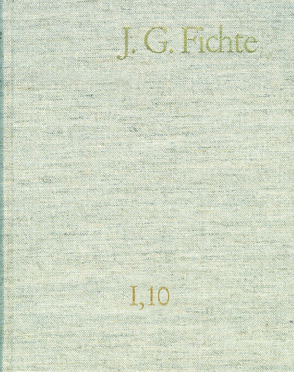
Dieser Band, der die Werkreihe abschließt, enthält als Haupttext die 1807/08 in Berlin öffentlich gehaltenen ›Reden an die deutsche Nation‹, in denen – auch in der Nachfolge Pestalozzis – zu einer neuen Erziehung der Deutschen als Mittel einer geistigen Erneuerung aufgerufen wird. Ferner legt der Band Petrarca- und Camões-Nachdichtungen vor sowie die ausgearbeitete Schlussvorlesung von 1810 ›Wissenschaftslehre in ihrem allgemeinen Umrisse‹, die Rede ›Ueber die einzig mögliche Störung der akademischen Freiheit‹, mit welcher Fichte im Oktober 1811 sein Amt als Rektor der Berliner Universität antritt, und einen Abdruck der beiden Vorlesungen vom Sommer 1812 ›Über die Bestimmung des Gelehrten‹. Den Abschluss des Bandes bilden vierzehn Rezensionen aus dem Jahre 1788 als Nachtrag.
In 1964, the first volume of series I (works) was published. With the publication of volume 10, the editors have now completed the edition of Fichte's works. Volume 10 contains publications of the last five years of Fichte's life.
The famous ›Addresses to the German Nation‹ that Fichte delivered publicly in Berlin in 1807/8 succeed the ›Grundzüge des gegenwärtigen Zeitalters‹ and the ›Anweisung zum seeligen Leben‹ and thus form the last part of the trilogy which marks Fichte's change of direction towards a Philosophy of History. Following Pestalozzi, Fichte appeals for a new education of the German people in order to achieve an intellectual reformation. At the same time, this work is shaped by Fichte's intention to participate – within the bounds of his possibilities – in the course of political events. Fichte connected Germany's loss of political autonomy due to Napoleon's dominance with an imminent intellectual decline in Germany, and was therefore urged to take action. He realised his right and duty to speak out.
Additionally, this volume contains Fichte's adaptations of Petrarca and Camoenes, his elaborated final lecture of 1810 ›Wissenschaftslehre in ihrem allgemeinen Umrisse‹, the speech ›Ueber die einzig mögliche Störung der akademischen Freiheit‹ (which Fichte delivered when he took up his office as headmaster at Berlin University in 1811), as well as his two summer term lectures of 1812 ›Über die Bestimmung des Gelehrten‹. The volume is completed by 14 reviews from 1788.
Aktualisiert: 2023-03-14
> findR *
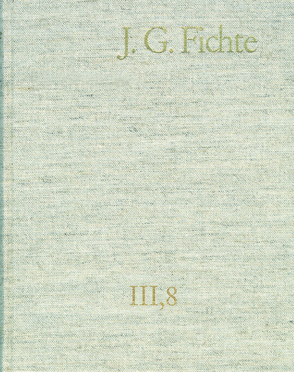
Der abschließende Band der Korrespondenzreihe bringt Briefe aus den beiden letzten Lebensjahren Fichtes, darunter einen Bericht über seinen philosophischen Lehrplan an die Regierung in Wien und Erörterungen zur Ästhetik (v.a. zur Baukunst) an L. F. Catel. Krankheit und Tod von Fichtes Eltern in den Jahren 1812 bzw. 1813 bilden einen weiteren Themenbereich. Eine Reihe von neu aufgefundenen Briefen der früheren Jahre und einige Briefe nach Fichtes Tod am 29. Januar 1814 von seiner Frau Marie Johanne an den Verleger Cotta, an die Freundinnen Charlotte von Schiller und Charlotte von Kalb sowie an zwei der Familie nahestehenden Schüler Fichtes (Helmholtz und Schulz) vervollständigen den Band. Ein Personengesamtverzeichnis für alle Briefebände wird die Arbeit mit der Reihe III erleichtern.
The concluding volume of Fichte’s Correspondence includes the letters from the final two years of his life. It also contains a report on Fichte’s philosophical lectures for the government of Vienna and reflections on aesthetics (including architecture) for L.F. Catel. Further topics include the illnesses and deaths of Fichte’s parents in the years 1812 and 1813. The volume is rounded off by a series of newly discovered letters from Fichte’s earlier years, as well as letters from his wife Marie Johanne to the publisher Cotta, and to friends Charlotte von Schiller and Charlotte von Kalb, and to two students (Helmholtz and Schulz) who were close to Fichte. A complete index of names for all the volumes of Fichte’s Correspondence greatly facilitates work with series III.
Aktualisiert: 2020-09-03
> findR *

Der Band enthält ›Die Staatslehre oder über das Verhältniss des Urstaates zum Vernunftreiche‹, die in der Redaktion des Fichte-Sohns Immanuel Hermann wiedergegeben wird, und das Diarium II (›In einem Traume[.]‹) vom August/September 1813, das sich ausschließlich mit Problemen der Wissenschaftslehre beschäftigt. Im ›Tagebuch über den Animalischen Magnetismus‹ vom September 1813 reflektiert Fichte aktuelle Phänomene aus dem Bereich der Medizin und Psychologie und konfrontiert sie mit einschlägiger Literatur (Puysegur) und eigenen Überlegungen.
›Die Staatslehre oder über das Verhältniss des Urstaates zum Vernunftreiche‹ is reproduced in the edition of Fichte’s son Immanuel Hermann. The ›Diarium II‹ (›In a Dream…‹) of August/September 1813 deals exclusively with the problems of the Wissenschaftslehre. In the ›Diary on Animal Magnetism‹ of September 1813 Fichte reflects on current phenomena from the domains of medicine and psychology and juxtaposes them with relevant contemporary literature (e.g. Puysegur) and with his own observations.
Aktualisiert: 2020-09-03
> findR *
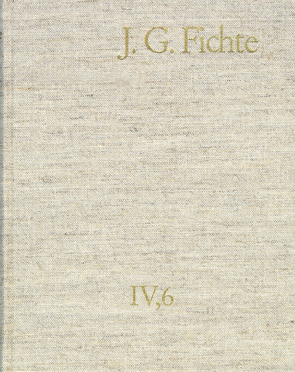
Auch Fichtes in seinen letzten Lebensjahren gehaltene Vorlesungen sind von den Transformationen der Spätlehre betroffen: Vorlesungen bzw. bei aller Komplexität recht knappe Vorbereitungstexte wie die ›Rechtslehre‹ und ›Sittenlehre‹ von 1812 (Bd. II,13), die ›Thatsachen des Bewußtseins‹ sowie mehrere Ansätze zur Ausarbeitung der ›Wissenschaftslehre‹ aus den Jahren 1813 und 1814 erfahren durch die hier vorgelegten studentischen Nachschriften bedeutende Verständnishilfe. Besonderes Interesse darf eine Nachschrift der umfangreichen ›Einleitung in die WL‹ beanspruchen, die bisher unveröffentlicht ist - gefolgt von fünf Vorlesungen zur ›Wissenschaftslehre‹ von 1814, denen Fichtes Tod ein Ende setzte.
The student transcripts of this volume considerably facilitate our understanding of Fichte’s difficult and terse preparatory texts. This not only holds for the revised lectures of the later works on the ›Rechtslehre‹ and ›Sittenlehre‹ of 1812, but also for ›The Facts of Consciousness‹ and the ›Wissenschaftslehre‹ (both from early 1813), the ›Introduction to the Wissenschaftslehre‹ (Fall, 1813) and the 1814 ›Wissenschaftslehre‹. The lecture transcript entitled ›Darstellung des Christenthums‹ documents a portion of the lectures on the ›Staatslehre‹. Because of its various hypothetical approaches to the elements that constitute consciousness, ›The Facts of Consciousness‹ merely serves as an introduction to the ›Wissenschaftslehre‹. Whereas it is the task of the ›Wissenschaftslehre‹ itself to supply a complete deduction of the cognitive presuppositions of these elements within a systematic framework. War forced the suspension of these lectures, and in winter 1813/14 Fichte renewed his attempt. Of these there is extant a hitherto unpublished transcript of a comprehensive ›Introduction‹, followed by five lectures from the 1814 ›Wissenschaftslehre‹. The latter was cut short by Fichte’s death.
Aktualisiert: 2020-09-03
Autor:
Matteo V D'Alfonso,
Faustino Fabianelli,
Johann Gottlieb Fichte,
Erich Fuchs,
Antonie Magen,
Hans Georg von Manz,
Ives Radrizzani,
Peter K. Schneider,
Martin Siegel,
David W. Wood,
Günter Zöller
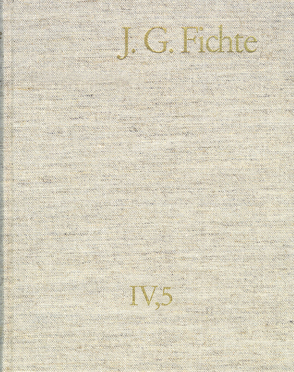
Die Nachschriften (Itzig, Halle, Lisco u.a.) der beiden ›Transzendentalen Logiken‹ von 1812 bieten je einen vollständigen Haupttext, der durch Passagen aus Parallelnachschriften ergänzt wird. Sie bieten zusätzliches Material für das Verständnis der Texte des Bandes II,14, etwa zur Analyse des empirischen Begreifens und zum Entwurf einer transzendentalen Logik, zum Begreifen des Begriffs und der Anschauung bis hin zur Deduktion des Raumes. ›Vom Studium der Philosophie überhaupt‹ (1812) schließlich erläutert neben den Bedingungen für das Verstehen der Wissenschaftslehre auch das Vorgehen Fichtes in den beiden ›Transzendentalen Logiken‹.
The student lecture transcripts (Itzig, Halle, Lisco, among others) of the two 1812 courses on Transcendental Logic furnish a complete primary text that is also supplemented by passages from parallel transcripts. They correspond to the content of Volume II,14 and provide additional material for an understanding of Fichte’s manuscripts, especially for the analysis of empirical cognition and the outline of a Transcendental Logic (›Vom Verhältnis der Logik zur wirklichen Philosophie‹, 1812), and for an understanding of the concept and the intuition up to the deduction of space (›Vom Unterschiede zwischen der Logik und der Philosophie selbst‹, 1812/13). Finally, ›On the Study of Philosophy in General‹ (1812) explicates the conditions for understanding the Wissenschaftslehre and Fichte’s procedure in the two versions of the ›Transcendental Logic‹.
Aktualisiert: 2023-03-14
> findR *
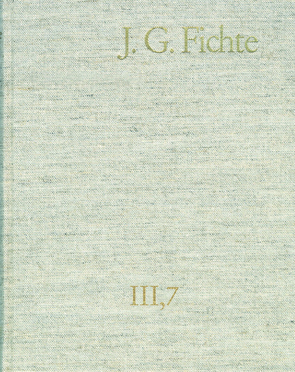
Neben den bisher aus der Briefeausgabe von W. Schulz bekannten Briefen (Korrespondenz mit den Dichtern Ernst Wagner und Fouqué, mit früheren Schülern und Verwandten) bilden die Briefe, die Fichte als Dekan und als Rektor der Berliner Universität mit den Behörden wechselte, den Schwerpunkt dieses Bandes. Unter diesen sind die Auseinandersetzungen innerhalb der Professorenschaft über die studentische Disziplin von besonderem Interesse. Fichte setzte sich mit dem Gewicht seines Amtes und seiner Persönlichkeit für einen unfair behandelten jüdischen Studenten ein und trat von seinem Amt zurück, als die überwiegende Mehrzahl seiner Kollegen auf ihrem Standpunkt beharrte.
In addition to the letters hitherto known from W. Schulz’s edition of Fichte’s Correspondence (letters to the writer Ernst Wagner, to Fichte’s father and other relatives after the death of the latter, to Fouqué, and to earlier students), the principal focus of this volume are the letters exchanged with the authorities while Fichte was the dean and rector of the University of Berlin. Especially interesting are the discussions among the professors concerning student discipline. Bringing the gravity of his office and personality to bear in his intervention on behalf of a Jewish student that had been unfairly treated, Fichte was forced to resign after the vast majority of his colleagues refused to budge from their position.
Aktualisiert: 2023-03-14
> findR *
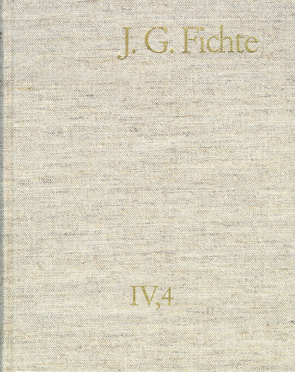
Fichtes allgemeine Einleitungsvorlesung ›Vom Studium der Philosophie‹, 1810 – nur in der Nachschrift von August Twesten erhalten – widmet sich der Frage: Wie ist die Mitteilung von Wissen möglich? Das gleiche Thema hat die Einleitungsvorlesung von 1811, deren drei Fassungen (die von Cauer, von Schopenhauer und einem Anonymus) abgedruckt werden, ebenso die Nachschriften (Cauer, Schopenhauer und »Hallesche«) der Vorlesung der ›Thatsachen des Bewußtseyns‹ aus demselben Jahr. Diese Nachschriften ergänzen einander und bieten eine objektive Darstellung der Gesamtheit des Wissens; zugleich führen sie ein in die ›Wissenschaftslehre 1812‹, die den Haupttext dieses Bandes bildet.
Fichte’s general introductory lecture of October 1810, “On the Study of Philosophy,” has been preserved only in a transcription by August Twesten (discovered in 1999). It addresses the question, How is the communication of knowledge (including empirical, historical, and a priori knowledge) possible? This is also the concern of Fichte’s introductory lecture from the winter semester of 1811/12. The latter thematizes even more clearly the difference between the methods of the sciences. Three versions of this lecture are available (by Cauer, Schopenhauer, and an anonymous auditor), and all of three of these are included in this volume. Three different transcripts of the lectures on “The Facts of Consciousness” from the same semester (1811/12) are also available (by Cauer, Schopenhauer, and an anonymous auditor, the “Halle transcript”). Fichte’s own manuscript of these lectures has not survived. This circumstance, combined with the fact that each of these three transcripts has its own distinctive advantages and supplements the other two, justifies the publication of all three. They provide an objective presentation of the totality of knowledge and serve as the didactic presupposition for understanding the complex argumentation of the 1812 Wissenschaftslehre (see Volume II,13). The primary text contained in this volume is the transcript of the 1812 Wissenschaftslehre. Of the seven surviving transcripts of this lecture series, manuscript Yg 21 (from the library of Halle University) is here published in full as the “guiding text,” though it is supplemented by significant variations, as contained in the qualitatively next-best versions (Cauer, Itzig).
Aktualisiert: 2020-09-03
> findR *
The concluding volume of Fichte’s Correspondence includes the letters from the final two years of his life. It also contains a report on Fichte’s philosophical lectures for the government of Vienna and reflections on aesthetics (including architecture) for L.F. Catel. Further topics include the illnesses and deaths of Fichte’s parents in the years 1812 and 1813. The volume is rounded off by a series of newly discovered letters from Fichte’s earlier years, as well as letters from his wife Marie Johanne to the publisher Cotta, and to friends Charlotte von Schiller and Charlotte von Kalb, and to two students (Helmholtz and Schulz) who were close to Fichte. A complete index of names for all the volumes of Fichte’s Correspondence greatly facilitates work with series III.
Aktualisiert: 2020-04-22
> findR *
The student lecture transcripts (Itzig, Halle, Lisco, among others) of the two 1812 courses on Transcendental Logic furnish a complete primary text that is also supplemented by passages from parallel transcripts. They correspond to the content of Volume II,14 and provide additional material for an understanding of Fichte’s manuscripts, especially for the analysis of empirical cognition and the outline of a Transcendental Logic (›Vom Verhältnis der Logik zur wirklichen Philosophie‹, 1812), and for an understanding of the concept and the intuition up to the deduction of space (›Vom Unterschiede zwischen der Logik und der Philosophie selbst‹, 1812/13). Finally, ›On the Study of Philosophy in General‹ (1812) explicates the conditions for understanding the Wissenschaftslehre and Fichte’s procedure in the two versions of the ›Transcendental Logic‹.
Aktualisiert: 2023-03-14
> findR *
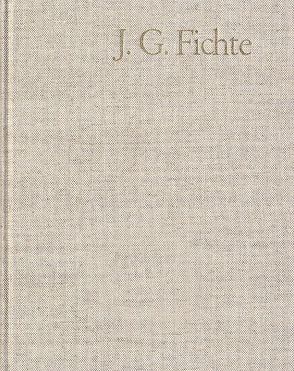
This volume presents the remaining texts of 1812. The lecture course ›Vom Verhältniß der Logik zur wirklichen Philosophie‹ delivered in the summer semester of 1812 is accessible to research for the first time. It analyzes empirical understanding and demonstrates the contradictory conception of thought in formal and transcendental logic, arguing that the formal-logical view of thought is untenable. This view of cognition is completed in the winter semester of 1812/13 in the earlier known work on transcendental logic, ›Vom Unterschiede zwischen der Logik und der Philosophie selbst‹. This text passes from an understanding of the concept and the intuition up to the deduction of space. This work counts as one of the major philosophical writings of Fichte’s late period and is published here in a significantly improved form. The introductory lecture ›On the Study of Philosophy in General‹ (WS 1812/13) not only sets out the conditions for understanding the ›Wissenschaftslehre‹ but also Fichte’s procedure in the various versions of his ›Transcendental Logic‹. The volume is supplemented by two smaller texts whose dating is uncertain, ›Zur Herstellung eines verlohren gegangenen Mskpts ...‹ and ›2. noch Auszug‹.
Aktualisiert: 2023-03-14
> findR *
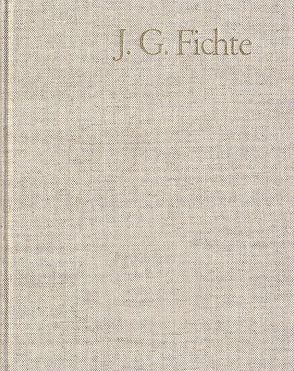
The student transcripts of this volume considerably facilitate our understanding of Fichte’s difficult and terse preparatory texts. This not only holds for the revised lectures of the later works on the ›Rechtslehre‹ and ›Sittenlehre‹ of 1812, but also for ›The Facts of Consciousness‹ and the ›Wissenschaftslehre‹ (both from early 1813), the ›Introduction to the Wissenschaftslehre‹ (Fall, 1813) and the 1814 ›Wissenschaftslehre‹. The lecture transcript entitled ›Darstellung des Christenthums‹ documents a portion of the lectures on the ›Staatslehre‹. Because of its various hypothetical approaches to the elements that constitute consciousness, ›The Facts of Consciousness‹ merely serves as an introduction to the ›Wissenschaftslehre‹. Whereas it is the task of the ›Wissenschaftslehre‹ itself to supply a complete deduction of the cognitive presuppositions of these elements within a systematic framework. War forced the suspension of these lectures, and in winter 1813/14 Fichte renewed his attempt. Of these there is extant a hitherto unpublished transcript of a comprehensive ›Introduction‹, followed by five lectures from the 1814 ›Wissenschaftslehre‹. The latter was cut short by Fichte’s death.
Aktualisiert: 2019-08-19
Autor:
Matteo V D'Alfonso,
Faustino Fabianelli,
Johann Gottlieb Fichte,
Erich Fuchs,
Antonie Magen,
Hans Georg von Manz,
Ives Radrizzani,
Peter K. Schneider,
Martin Siegel,
David W. Wood,
Günter Zöller
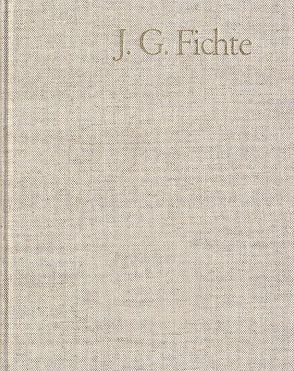
Fichte’s general introductory lecture of October 1810, “On the Study of Philosophy,” has been preserved only in a transcription by August Twesten (discovered in 1999). It addresses the question, How is the communication of knowledge (including empirical, historical, and a priori knowledge) possible? This is also the concern of Fichte’s introductory lecture from the winter semester of 1811/12. The latter thematizes even more clearly the difference between the methods of the sciences. Three versions of this lecture are available (by Cauer, Schopenhauer, and an anonymous auditor), and all of three of these are included in this volume. Three different transcripts of the lectures on “The Facts of Consciousness” from the same semester (1811/12) are also available (by Cauer, Schopenhauer, and an anonymous auditor, the “Halle transcript”). Fichte’s own manuscript of these lectures has not survived. This circumstance, combined with the fact that each of these three transcripts has its own distinctive advantages and supplements the other two, justifies the publication of all three. They provide an objective presentation of the totality of knowledge and serve as the didactic presupposition for understanding the complex argumentation of the 1812 Wissenschaftslehre (see Volume II,13). The primary text contained in this volume is the transcript of the 1812 Wissenschaftslehre. Of the seven surviving transcripts of this lecture series, manuscript Yg 21 (from the library of Halle University) is here published in full as the “guiding text,” though it is supplemented by significant variations, as contained in the qualitatively next-best versions (Cauer, Itzig).
Aktualisiert: 2020-04-22
> findR *
The primary focus of ›The Facts of Consciousness‹ (January 1813) is on practical facts and their justification, and provides an introductory platform for the incomplete ›Wissenschaftslehre‹ of February 1813. Its point of departure is that all cognition is merely an understanding of itself. The further principles of cognition are then derived from this understanding of understanding. The ›Diarium I‹ (March-August 1813) is here published for the very first time, and offers a glimpse into Fichte’s preparatory work for his lectures on Political Theory (Staatslehre) with their mixture of historical-philosophical and political reflections. Furthermore, ample space is devoted to speculations on an ultimate grounding of the Wissenschaftslehre.
Aktualisiert: 2020-04-22
Autor:
Johann Gottlieb Fichte,
Erich Fuchs,
Hans Gliwitzky,
Reinhard Lauth,
Hans Georg von Manz,
Günter Meckenstock,
Ives Radrizzani,
Erich Ruff,
Peter K. Schneider,
Martin Siegel,
Günter Zöller
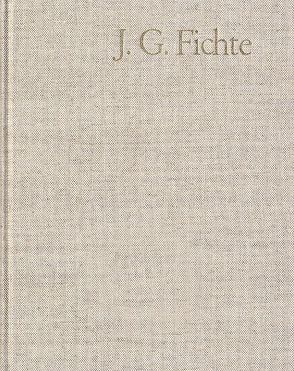
In 1964, the first volume of series I (works) was published. With the publication of volume 10, the editors have now completed the edition of Fichte's works. Volume 10 contains publications of the last five years of Fichte's life.
The famous ›Addresses to the German Nation‹ that Fichte delivered publicly in Berlin in 1807/8 succeed the ›Grundzüge des gegenwärtigen Zeitalters‹ and the ›Anweisung zum seeligen Leben‹ and thus form the last part of the trilogy which marks Fichte's change of direction towards a Philosophy of History. Following Pestalozzi, Fichte appeals for a new education of the German people in order to achieve an intellectual reformation. At the same time, this work is shaped by Fichte's intention to participate – within the bounds of his possibilities – in the course of political events. Fichte connected Germany's loss of political autonomy due to Napoleon's dominance with an imminent intellectual decline in Germany, and was therefore urged to take action. He realised his right and duty to speak out.
Additionally, this volume contains Fichte's adaptations of Petrarca and Camoenes, his elaborated final lecture of 1810 ›Wissenschaftslehre in ihrem allgemeinen Umrisse‹, the speech ›Ueber die einzig mögliche Störung der akademischen Freiheit‹ (which Fichte delivered when he took up his office as headmaster at Berlin University in 1811), as well as his two summer term lectures of 1812 ›Über die Bestimmung des Gelehrten‹. The volume is completed by 14 reviews from 1788.
Aktualisiert: 2023-03-14
> findR *
This volume contains Fichte›s lectures held between May 1811 and August 1812. These include a particularly well written version of a series of lectures, designed as an introduction into the business of philosophy, on the determination of the nature and the duties of a scholar as well as the lectures on the only two special disciplines which Fichte had on his agenda in Berlin: jurisprudence and ethics. This is a new publication of these lectures, the manuscripts of which were re-examined, and also includes the transcripts of Fichte‹s colleagues. A detailed introduction explains the individual kinds of lectures within Fichte’s system of theories.
Aktualisiert: 2023-03-14
> findR *
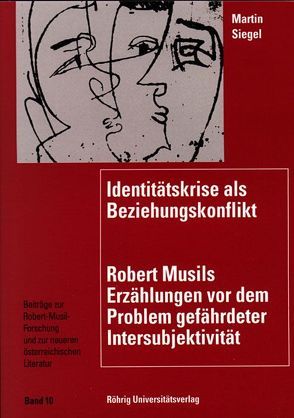
Im Zentrum aller größeren Erzählungen Musils - mit Ausnahme der letzten Erzählung Die Amsel - steht eine konflikthafte Mann-Frau-Beziehung. Die Gestaltung dieser Beziehungskonflikte, häufig als unzugänglich bezeichnet, ist als dichterische Reaktion auf den Zerfall des Ich zu lesen, wie er zu Beginn unseres Jahrhunderts etwa von Ernst Mach gesehen wurde - so lautet die vorgestellte These. Schwenkt man die Perspektive von der außertextlichen Bedeutung des literarischen Werks auf dessen leserbindendes Potential, zeigt sich innerhalb der Musilschen Erzählungen eine Entwicklung. Musil wendet das Problem der Uneinheitlichkeit des Ich, von dem schon seine Dissertation über Mach handelt, auf das der Undurchschaubarkeit des Gegenüber: angefangen bei der Dominanz der ldentitätsproblematik im frühen Text Das verzauberte Haus über das Balanceverhältnis von intra- und interpersonellem Konflikt in den Vereinigungen bis hin zur Erzählwelt der Drei Frauen, die sich dem Leser nurmehr über die Motivationen der Hauptfiguren erschließt.
Aktualisiert: 2022-06-14
> findR *
›Die Staatslehre oder über das Verhältniss des Urstaates zum Vernunftreiche‹ is reproduced in the edition of Fichte’s son Immanuel Hermann. The ›Diarium II‹ (›In a Dream…‹) of August/September 1813 deals exclusively with the problems of the Wissenschaftslehre. In the ›Diary on Animal Magnetism‹ of September 1813 Fichte reflects on current phenomena from the domains of medicine and psychology and juxtaposes them with relevant contemporary literature (e.g. Puysegur) and with his own observations.
Aktualisiert: 2019-08-19
> findR *
MEHR ANZEIGEN
Bücher von Siegel, Martin
Sie suchen ein Buch oder Publikation vonSiegel, Martin ? Bei Buch findr finden Sie alle Bücher Siegel, Martin.
Entdecken Sie neue Bücher oder Klassiker für Sie selbst oder zum Verschenken. Buch findr hat zahlreiche Bücher
von Siegel, Martin im Sortiment. Nehmen Sie sich Zeit zum Stöbern und finden Sie das passende Buch oder die
Publiketion für Ihr Lesevergnügen oder Ihr Interessensgebiet. Stöbern Sie durch unser Angebot und finden Sie aus
unserer großen Auswahl das Buch, das Ihnen zusagt. Bei Buch findr finden Sie Romane, Ratgeber, wissenschaftliche und
populärwissenschaftliche Bücher uvm. Bestellen Sie Ihr Buch zu Ihrem Thema einfach online und lassen Sie es sich
bequem nach Hause schicken. Wir wünschen Ihnen schöne und entspannte Lesemomente mit Ihrem Buch
von Siegel, Martin .
Siegel, Martin - Große Auswahl an Publikationen bei Buch findr
Bei uns finden Sie Bücher aller beliebter Autoren, Neuerscheinungen, Bestseller genauso wie alte Schätze. Bücher
von Siegel, Martin die Ihre Fantasie anregen und Bücher, die Sie weiterbilden und Ihnen wissenschaftliche Fakten
vermitteln. Ganz nach Ihrem Geschmack ist das passende Buch für Sie dabei. Finden Sie eine große Auswahl Bücher
verschiedenster Genres, Verlage, Schlagworte Genre bei Buchfindr:
Unser Repertoire umfasst Bücher von
- Siegelberg, Hartmut
- Siegelberg, Jens
- Siegelberg, Mark
- Siegelberg, Mira L.
- Siegele, Dietmar
- Siegele, Frank
- Siegele, Jochen
- Siegele, Josef
- Siegele, Klaus
- Siegele, Patrick
Sie haben viele Möglichkeiten bei Buch findr die passenden Bücher für Ihr Lesevergnügen zu entdecken. Nutzen Sie
unsere Suchfunktionen, um zu stöbern und für Sie interessante Bücher in den unterschiedlichen Genres und Kategorien
zu finden. Neben Büchern von Siegel, Martin und Büchern aus verschiedenen Kategorien finden Sie schnell und
einfach auch eine Auflistung thematisch passender Publikationen. Probieren Sie es aus, legen Sie jetzt los! Ihrem
Lesevergnügen steht nichts im Wege. Nutzen Sie die Vorteile Ihre Bücher online zu kaufen und bekommen Sie die
bestellten Bücher schnell und bequem zugestellt. Nehmen Sie sich die Zeit, online die Bücher Ihrer Wahl anzulesen,
Buchempfehlungen und Rezensionen zu studieren, Informationen zu Autoren zu lesen. Viel Spaß beim Lesen wünscht Ihnen
das Team von Buchfindr.










